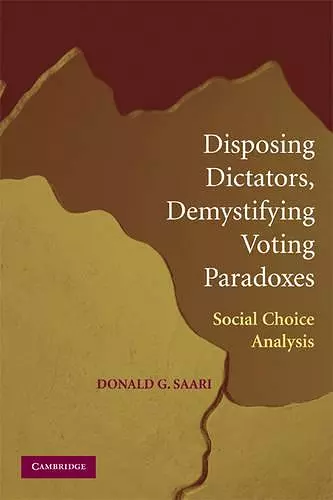Disposing Dictators, Demystifying Voting Paradoxes
Social Choice Analysis
Format:Paperback
Publisher:Cambridge University Press
Published:25th Aug '08
Currently unavailable, and unfortunately no date known when it will be back
This paperback is available in another edition too:
- Hardback£41.00(9780521516051)

This book is a positive analysis of voting 'paradoxes' and argues that negative 'impossibility' results are not justified.
For more than two centuries, bad news and negative assertions expressed in innumerable voting paradoxes and theorems have asserted the impossibility of doing what seems to be natural in voting and decision rules. This book provides a positive take on the area.We decide by elections, but do we elect who the voters really want? The answer, as we have learned over the last two centuries, is 'not necessarily'. What a negative, frightening assertion about a principal tool of democracy! This negativism has been supported by two hundred years of published results showing how bad the situation can be. This expository, largely non-technical book is the first to find positive results showing that the situation is not anywhere as dire and negative as we have been led to believe. Instead there are surprisingly simple explanations for the negative assertions, and positive conclusions can be obtained.
'The future generations of social choice theorists will certainly find much inspiration and profound insights in this book. For anyone working in the field of voting and social choice the book will provide a rich collection of results, methodological tools, and challenging open problems.' Hannu Nurmi, Academy of Finland
'Donald Saari provides not only an engaging and accessible explanation of the celebrated dictatorial theorems of Arrow, Sen, and Chichilnisky but also an intuitive argument for why we should not be surprised by the negative results of these seminal theorems.' Tommy Ratliff, Wheaton College
'Arrow's theorem is at the origin of the birth of modern social choice theory in the late 1940s and 1950s. Sen's theorem on liberalism and the Pareto principle (published in 1970) created an upsurge of fundamental studies in the so-called non-welfaristic issues in normative economics. Both results are essentially negative (impossibilities). Saari, in this book, demonstrates that we must not overestimate these negative aspects. Particularly noteworthy are the remarkable presentations of the topological approach to social choice and of the generic stability of the core of voting games (including a very short introduction to a new solution concept, the finesse point), where Saari, once again, shows his wonderful pedagogical talent.' Maurice Salles, University of Caen
'… The book is definitely of interest to students and researchers from many different areas having to deal with aggregation problems. … most entertaining and illuminating, there is a lot to learn from this book for everyone who cares about whether voters elect what they really want.' Mathematical Reviews
'The book is definitely of interest to students and researchers from many different areas having to deal with aggregation problems. … there is a lot to learn from this book for everyone who cares about whether voters elect what they really want.' Journal of the American Statistical Association
ISBN: 9780521731607
Dimensions: 228mm x 153mm x 14mm
Weight: 350g
256 pages